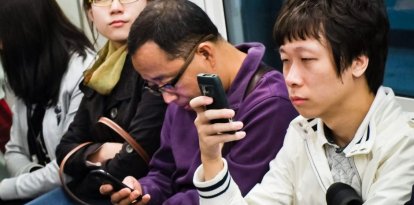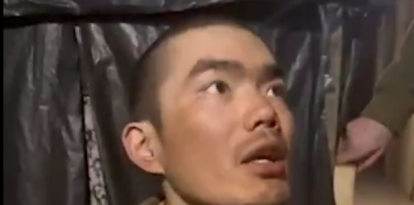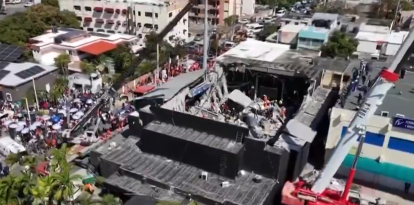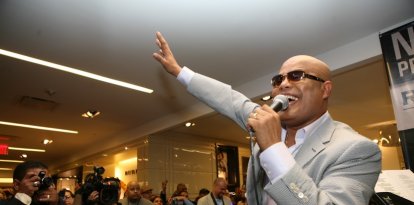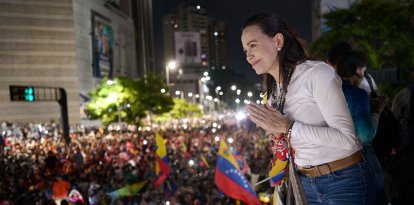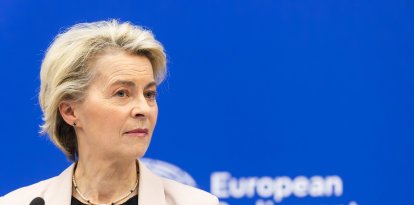Bolivia: Government takes control of the situation, arrests General Zúñiga
The failed coup was led by Juan José Zúñiga, who had been removed from his position as army commander hours before.

Military troops deployed in front of the Palacio Quemado in Plaza Murillo in La Paz, Bolivia, on June 26, 2024.
The military uprising in Bolivia has failed. Tonight, the police in this South American country arrested the recently dismissed General Juan José Zúñiga, who had led a coup d'état against the government of Bolivian President Luis Arce on Wednesday.
🔵 #ANF | #Urgente Aprehenden al general Juan José Zúñiga y este denuncia que el presidente Luis Arce le pidió "preparar algo" para levantar su "popularidad". pic.twitter.com/ls7Wd5E1tF
— Agencia de Noticias Fides (@noticiasfides) June 26, 2024
Prior to his arrest, Zuñiga told local media his intention to change "the government cabinet" in order to establish a "true democracy" in Bolivia and to free "all political prisoners" including former president Jeanine Añez, opposition governor Luis Fernando Camacho and "all imprisoned military officers." However, his efforts were stopped by the Bolivian government.
Hours before the arrest, President Arce, in a show of strength, spoke from Casa Grande, the current seat of the Bolivian government, where he swore in the new military command, announcing Jose Wilson Sanchez Velasquez as Zuñiga's replacement, and also asked for the support of Bolivians to defend democracy.
"Here we are, the entire national government, with all its ministers, standing with with our vice president, standing here in Casa Grande to confront all coup attempts, against all attempts to threaten our democracy," said Arce. "We cannot allow coup attempts to take Bolivian lives, we want to urge you to defend democracy together with us. We are standing firm in Casa Grande with the social organizations."
🚨 #BOLIVIA | Declaración oficial del presidente Luis Arce tras las movilizaciones irregulares de unidades del Ejército pic.twitter.com/SmtFqd5Fpe
— VOZ (@VozMediaUSA) June 26, 2024
Minutes before Zúñiga's arrest, the Bolivian Attorney General's Office announced in a statement the initiation of a "criminal investigation" against the former commander of the Bolivian Army and all those soldiers who supported him.
Comunicado FGE N° 004 pic.twitter.com/Sb1TCFgyWg
— Fiscalía de Bolivia (@FGE_Bolivia) June 26, 2024
An restrained rebellion
Through his account on X (formerly Twitter), President Arce alerted Bolivians and the international community about the military uprising in the South American country.
In his short message, published at 14:57 local time, he pointed out that there was an "irregular mobilization" of "some units" of the Bolivian Army. "Democracy must be respected," he insisted at the height of the tensions.
Denunciamos movilizaciones irregulares de algunas unidades del Ejército Boliviano. La democracia debe respetarse.
— Luis Alberto Arce Catacora (Lucho Arce) (@LuchoXBolivia) June 26, 2024
At that time, the Bolivian media began to report that the uprising was led by General Zúñiga, who had been removed from his position as army commander hours earlier. This occurred after he warned former socialist president Evo Morales about a potential arrest if he decided to run again for the presidency.
"Our homeland, once again, is under attack by internal and external enemies who seek division, destabilization and hatred among Bolivians, in order to seize natural resources for the benefit of petty interests and power groups that respond to autocracy," Zúñiga had said hours before leading the rebellion.
A report by the Spanish newspaper El País of Spain pointed out that the soldiers who accompanied Zúñiga, armed and with tanks, occupied the Palacio Quemado, the former seat of government, after forcing the doors with an armored vehicle. The same could be seen in a viral video published on social media.
BREAKING: Apparent coup ongoing in Bolivia as armored truck seen ramming into presidential palace pic.twitter.com/daIrTdVCTC
— Breaking911 (@Breaking911) June 26, 2024
"Arce himself, as seen in images disseminated by Bolivian media on social networks, has stood up to Zuñiga and ordered the withdrawal of the military," reported El País.
🚨 | Un nuevo video muestra el enfrentamiento entre el presidente de Bolivia y el general Juan José Zúñiga
— VOZ (@VozMediaUSA) June 26, 2024
🎥: @redstreamnet pic.twitter.com/sIEoQpSh1h
Shortly thereafter, President Arce called on his followers to defend democracy. "We need the people to mobilize against the coup d'état. We cannot allow the return of coup attempts. We salute the organizations for their mobilization for democracy. Long live Bolivia. Long live democracy," said the head of state from Casa Grande del Pueblo, the current seat of government located a few meters from the Palacio Quemado. At that point he had not yet sworn in the new military command.
Reactions to the "coup"
Shortly after the uprising began, several Bolivian political leaders condemned the uprising. In a matter of minutes, socialist Evo Morales denounced the uprising as a "coup d'état."
"A coup d'état is in the making. At this moment, personnel of the Armed Forces and tanks are deployed in Plaza Murillo," said Morales on X. "We call for a National Mobilization to defend Democracy against the coup d'état plan that is being hatched in the general´s mind."
Convocamos a una Movilización Nacional para defender la Democracia frente al golpe de Estado que se gesta a la cabeza del Gral. Zuñiga.
— Evo Morales Ayma (@evoespueblo) June 26, 2024
Declaramos paro general indefinido y bloqueo de caminos.
No permitiremos que las Fuerzas Armadas violenten la democracia y amedrenten al…
At the same time, Jeanine Añez, opposition leader, political prisoner and also former president of Bolivia, repudiated the military mobilization on X and advocated for a democratic exit of Arce and his MAS party.
"Total repudiation of the mobilization of the military in Plaza Murillo trying to destroy the constitutional order, the MAS with Arce and Evo must leave through the vote in 2025. Bolivians will defend democracy," said Añez.
Repudio total a movilización de Militares en plaza Murillo pretendiendo destruir el orden constitucional, el MAS con Arce y Evo deben irse a través del voto el año 2025. Los bolivianos defenderemos la democracia.
— Jeanine Añez Chávez (@JeanineAnez) June 26, 2024
Internationally, the military uprising also was rejected by the Organization of American States (OAS). Secretary General, Luis Almagro, emphasized zero tolerance for "any form of violation of the constitutional order" in Bolivia.
"We express our solidarity with President Luis Arce Catacora. The international community, the OAS General Secretariat will not tolerate any form of breach of the legitimate constitutional order in Bolivia or anywhere else," Almagro said from Asuncion, Paraguay, where the organization's General Assembly is being held until Friday.
Mis palabras hoy de solidaridad con el Gobierno Democratico de Bolivia y condena a las acciones del ejército de ese país en el marco de la #AsambleaOEA sobre los acontecimientos en #Bolivia pic.twitter.com/OpOIxW6OP6
— Luis Almagro (@Almagro_OEA2015) June 26, 2024
This is a developing story.
RECOMMENDATION
